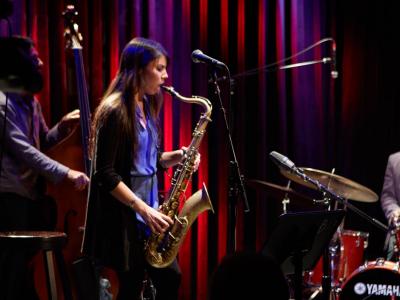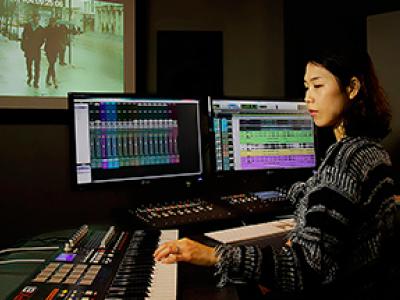What does a Staff Writer do?
Often contrasted with performing songwriters, who record and perform their own compositions, staff writers are songwriters who specialize in creating hits for the commercial market. To do so, staff writers must be able to write to specification, work within distinct genres and markets, and produce demo recordings that demonstrate a song's potential.
As content creators their audience is twofold, including both the general music-loving public and industry players like recording artists, producers, A&R management teams, and music publishing companies—all parties that could help staff writers get songs recorded and released. Royalties from recorded songs constitute the bulk of a staff writer's income, and success in this field means having the artistry to write successful songs and the business-sense and connections to ensure they find a home with a good recording artist.
When not busy writing, staff writers are usually engaged in a host of other activities: networking, meetings, making demos, and attending shows at night.
While a staff writer can be any songwriter who creates songs for others, in the industry the term often refers specifically to a songwriter who has signed an exclusive songwriting agreement with a publisher. This means that the publisher pays the songwriter a monthly advance and provides numerous support services, such as pitching their songs, managing their rights, and setting up cowriting sessions with other writers. In exchange, publishers receive instant publication rights to every song a staff writer creates during the contracted period, as well as the delivery of an agreed-upon annual quota of songs.
The term "staff writer" is actually a misnomer, as staff writers receive neither salary nor benefits from the publisher, and as such are not actually staff. Instead, their payment is in the form of an advance—essentially, a zero-interest loan—on the future royalties earned by their songs.
This raises an important question: Why would anyone want to be a staff writer if the job doesn't mean getting a paycheck? For one thing, music publishers have years of industry knowledge and connections that help writers get songs recorded with major label artists. For another, staff writing arrangements are still amongst the most attainable ways to work full-time as a songwriter. The advance system ensures that staff writers have enough money to quit their day job and focus their energy entirely on creating new songs. In an industry full of artists working day jobs just to get by, the appeal of this cannot be overstated.
At a Glance
Staff writers might rotate among gigs as a staff writer (writing the music and lyics themselves), a songwriter-producer (creating the backing track), and a top-line songwriter (creating the vocals and lyrics). Whether they work more as one or the other largely depends on which industry they're based in. The pop- and hip-hop-oriented industries of New York and Los Angeles tend to favor collaborations between songwriter-producers and top-liners, whereas the country music industry of Nashville still uses traditional, holistic songwriting techniques to create most of its material. As such, the largest working population of staff writers in the country is based in Nashville.
Additionally, while some songwriters begin as performing artists and others as songwriters for hire, the choice is far from binding. Plenty of pop and country stars got their start writing songs for other artists before landing a record deal of their own, or vice versa. The primary career goal for success-oriented staff writers is to craft as many hit songs as possible and, through this, to develop a strong industry reputation. This serves the dual purpose of increasing their royalty-based income and improving their position at the negotiation table. Additionally, staff writers can go on to become independent song pluggers, label managers for independent labels, members of label A&R teams, or music publishers.
Most staff writers start freelance, which means they have to pitch their own songs to established industry players in the hope of catching someone's eye: the aforementioned recording artists, A&R teams, producers, and music publishers. This is a daunting and difficult stage—learning how to navigate the record industry is a lifelong process for those without preexisting connections—but it's one that almost all staff writers must overcome. Those who make it seek out collaborations with more established writers, network at every industry event and concert they can attend, drop off demos of their work with publishers, shamelessly self-promote, build professional websites with samples of their work, and even perform their own compositions at venues that are known as industry hotbeds.
Freelance songwriters who are struggling might consider working with a song plugger, a sort of independent A&R professional who pitches songs to labels and publishers. When considering hiring a song plugger, one should thoroughly investigate their reputation and legitimacy, and consult with an entertainment attorney before signing a contract.
- Lyric writing
- Melody writing
- Track writing
- Harmony
- Demo production
- Vocal or instrumental ability
Songwriting ability can only be developed by writing songs. Finding success as a staff writer, however, is a completely different matter; this requires networking, self-promotion, and entrepreneurial skills, as well as good business-sense. In order to even reach the starting line, staff writers must be incredibly tenacious and hardworking. On the other hand, making it in the long run might be more about the ability to assess the current music scene and write songs that are well-positioned to become hits. This requires an ability to critique one's own work and an open-mindedness when it comes to compositional style.
While some cling to the myth that songwriters are beholden to a muse and create when inspiration strikes, the truth is that songwriting is a business, a practice, and a habit. While Nashville staff writers are likely to work set hours in the office of their publisher, professional staff writers in other industries are almost always their own bosses and must set their own hours, working out of home studios.
When not busy writing, staff writers are usually engaged in a host of other activities: networking, meetings, making demos, and attending shows at night. While most think of songwriting as a solitary art, staff writers collaborate frequently, and may participate in multiple songwriting sessions in a single day. Most beginning songwriters work a day job in a related field—teaching music, producing demos, or assisting at industry firms—while staff writers can focus exclusively on writing music. The major industries for staff writers are located in Nashville, New York City, and Los Angeles.









